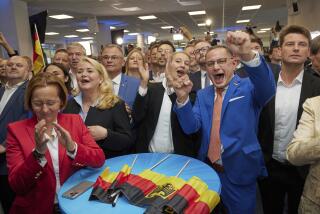EUROPE : Ex-Communists Don’t Look Back
- Share via
WARSAW — When the former Communists won parliamentary elections here more than two years ago, a giddy Jerzy Urban appeared at party headquarters with a gigantic bottle of champagne.
The ubiquitous spokesman for Poland’s last authoritarian regime was feeling so self-satisfied that he even posed for photographers with his tongue sticking out.
But embarrassed leaders of the triumphant Democratic Left Alliance never popped the cork with Urban, who publishes an acerbic political weekly that often mocks Poland’s transformation. And when former Communist Aleksander Kwasniewski won the Polish presidency last year, Urban was not on hand.
“I apologize to all those--and some of them are here in this room--who suffered injustice and misdeeds from the authorities and the system before 1989,” Kwasniewski told Polish lawmakers, publicly proclaiming his revamped party’s break with the past.
Communists are back in Poland and across Central and Eastern Europe, but old-style communism is not.
As the world anxiously awaits the outcome of next month’s presidential election in Russia--where some fear a victory by Communist Party leader Gennady A. Zyuganov would threaten democratic and market reforms--analysts say resurgent ex-Communists elsewhere in the region have little in common with their backward-looking Moscow brethren.
If Communists turn back the clock in Russia, the analysts say, do not expect Moscow’s erstwhile vassals in the former Eastern Bloc to do the same.
Enthusiasm for democracy and the free market varies greatly from country to country, and some reformed Communists remain as corrupt and authoritarian as ever.
But there is no groundswell of support for a return to the socialist way of yore, particularly one dominated by Moscow.
Indeed, Eastern Europeans of most political leanings view the Communist resurgence in Moscow--and its preoccupation with Russia’s lost empire--with more consternation than excitement.
While communism was home-grown in Russia, it was an instrument of imperialism elsewhere.
“Things may be bad here but not as bad as before 1989,” said a Western diplomat in Slovakia, which has one of the poorest records of democratic reform in Central Europe and a governing elite with strong ties to the Communist-era nomenklatura. “The emphasis remains on the West and getting Western capital.”
With a few exceptions, such as the former Soviet republic of Belarus, which recently tightened its association with Moscow, the new breed of former Communists among Russia’s neighbors owes nothing to Moscow and has no allegiance to the ideology of old.
“The specter of communism,” made famous by Karl Marx in the “Communist Manifesto” of 1848, is not haunting Europe again, even though only a handful of countries in the region--including Albania, the Czech Republic, Estonia and Latvia--have governments that were not born from the Communist past.
Instead, many of the former Communists are recasting themselves as social democrats, a left-wing alternative to socialism that is popular in Western European democracies and was actually derided by Marx.
Pragmatic, reformist and experienced in governing, the new social democrats of the East have won voters by promising to soften the blow of capitalism without returning to traditional socialism.
Many have gotten wildly rich because of the transformation, giving them political and financial stakes in its perpetuation.
Even the most moribund reformers with questionable social democratic credentials, such as those in Romania, are pushing for entry into the European Union and North Atlantic Treaty Organization, not a reassembling of pre-1989 alliances, as has been advocated by Communists in Moscow.
“People want compromise and pragmatic leaders,” Kwasniewski said in an interview. “The new system has not solved people’s problems. But only a very small part of society is nostalgic.”
How to find compromise without undoing democratic reforms, undermining the economy and scaring off Western investors has become the mainstay of political debate among former Communists in the region.
The Hungarian Socialist Party, successor to the Communists, has aggressively set out to dismantle the country’s bloated social-welfare system, but the controversial effort has divided the party and angered its traditional working-class supporters.
In Bulgaria, a fiercely anti-Communist president and a parliament dominated by former Communists have been locked in a bitter dispute over the pace of reforms.
President Zhelyu Zhelev says the Bulgarian Socialist Party is trying to smother private enterprise, while Prime Minister Zhan Videnov accuses Zhelev of protecting an “unscrupulous minority of racketeers” who has profited from the changes.
“In the end [of the 1980s], communism was already falling apart, and its main aim had become simply to have power,” Polish historian Jerzy Holzer said. “Those Communists who later came to lead post-Communist parties were people without ideology. They were opportunists and pragmatists, and in that sense they were able to adjust to the new political situation.”
Die-hard Communists who resisted the reform wave, by contrast, have been relegated to the political ash heap.
In the Czech Republic, for example, where national elections will be held in two weeks, the Communist Party of Bohemia and Moravia is expected to collect just 10% of the vote, while a hard-line splinter group, the Party of Czechoslovak Communists, doesn’t even register in opinion polls.
The Czech Social Democratic Party, meanwhile, is showing large gains against the right-wing ruling party of Prime Minister Vaclav Klaus. The social democrats, who trace their roots to the 19th century, were absorbed by the Communist Party in 1948 but separated again after 1989.
“Russia is really the only country where Communists are openly Communist and proud of their heritage,” said Juri Luik, senior associate at the Carnegie Endowment for International Peace. “Central European [Communists] are ready to play in the new playground, but Russian Communists say they are ready to change the rules of the game.”
(BEGIN TEXT OF INFOBOX / INFOGRAPHIC)
Communist Connections
A new breed of reformed Communists has risen to power in some Baltic and former Warsaw Pact countries.
BULGARIA*
President: Zhelyu Zhelev (opposition figure under communism)
Ruling parliamentary party: Bulgarian Socialist Party (largely former Communists)
****
CZECH REPUBLIC
President: Vaclav Havel (opposition figure under communism)
Ruling parliamentary parties: Center Right Coalition: Civic Democratic Party, Christian Democratic Party and Civic Democratic Alliance
****
ESTONIA
President: Lennart Meri
Ruling parliamentary parties: Coalition Party, Reform Party-Liberal
****
HUNGARY*
President: Arpad Goncz (opposition figure under communism)
Ruling parliamentary parties: Socialist Party (former Communists) and Federation of Free Democrats
****
LATVIA
President: Guntis Ulmanis
Ruling parliamentary parties: Saimnieks Democratic Party, Latvian Way Union, Fatherland and Freedom Alliance
****
LITHUANIA*
President: Algirdas Brazauskas (former Communist)
Ruling parliamentary party: Democratic Labor Party (former Communists)
****
POLAND*
President: Aleksander Kwasniewski (former Communist)
Ruling parliamentary parties: Democratic Left Alliance and Polish Peasant Party (both with Communist-era roots)
****
ROMANIA*
President: Ion Iliescu (former Communist)
Ruling parliamentary party: Party of Social Democracy (former Communists)
****
SLOVAKIA*
President: Michal Kovac (former Communist)
Ruling parliamentary parties: Movement for Democratic Slovakia, Assn. of Workers of Slovakia and Slovak National Party (includes former Communists)
* Countries where former Communists hold high office
More to Read
Sign up for Essential California
The most important California stories and recommendations in your inbox every morning.
You may occasionally receive promotional content from the Los Angeles Times.










